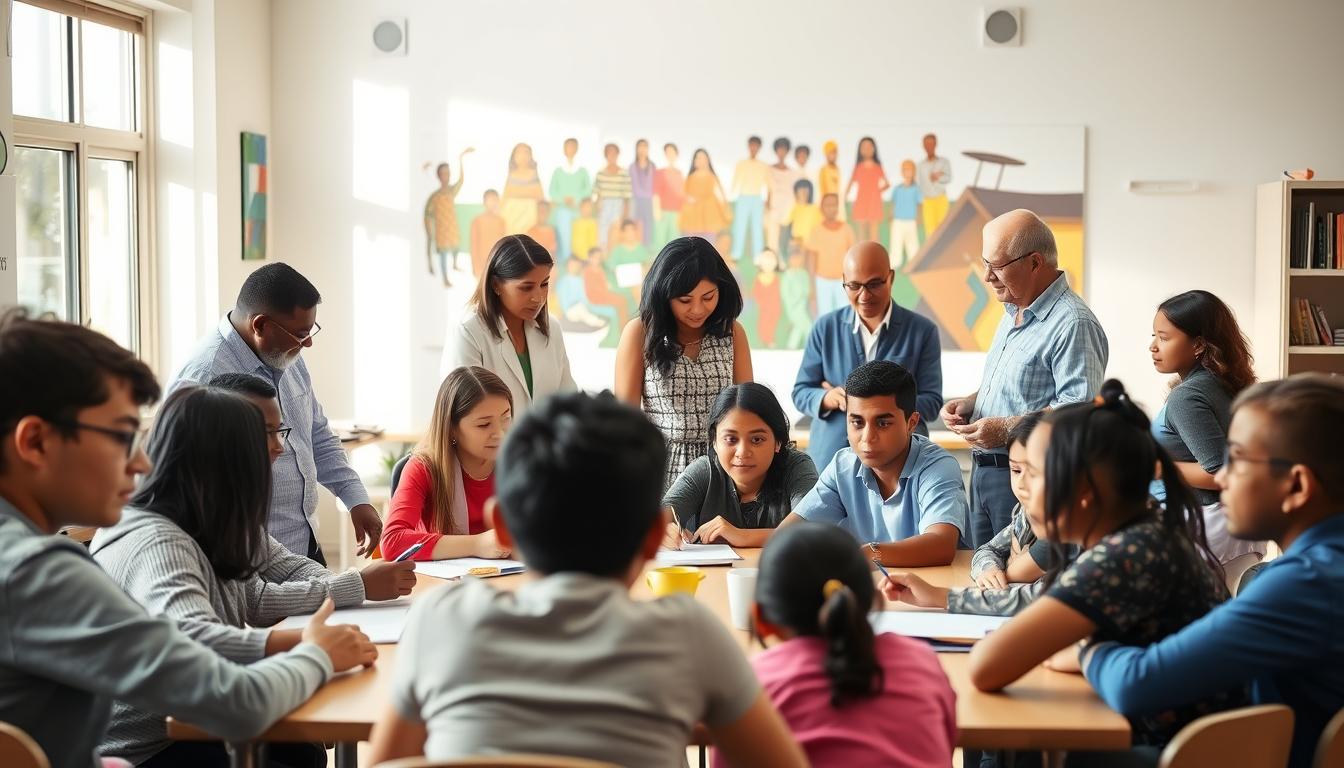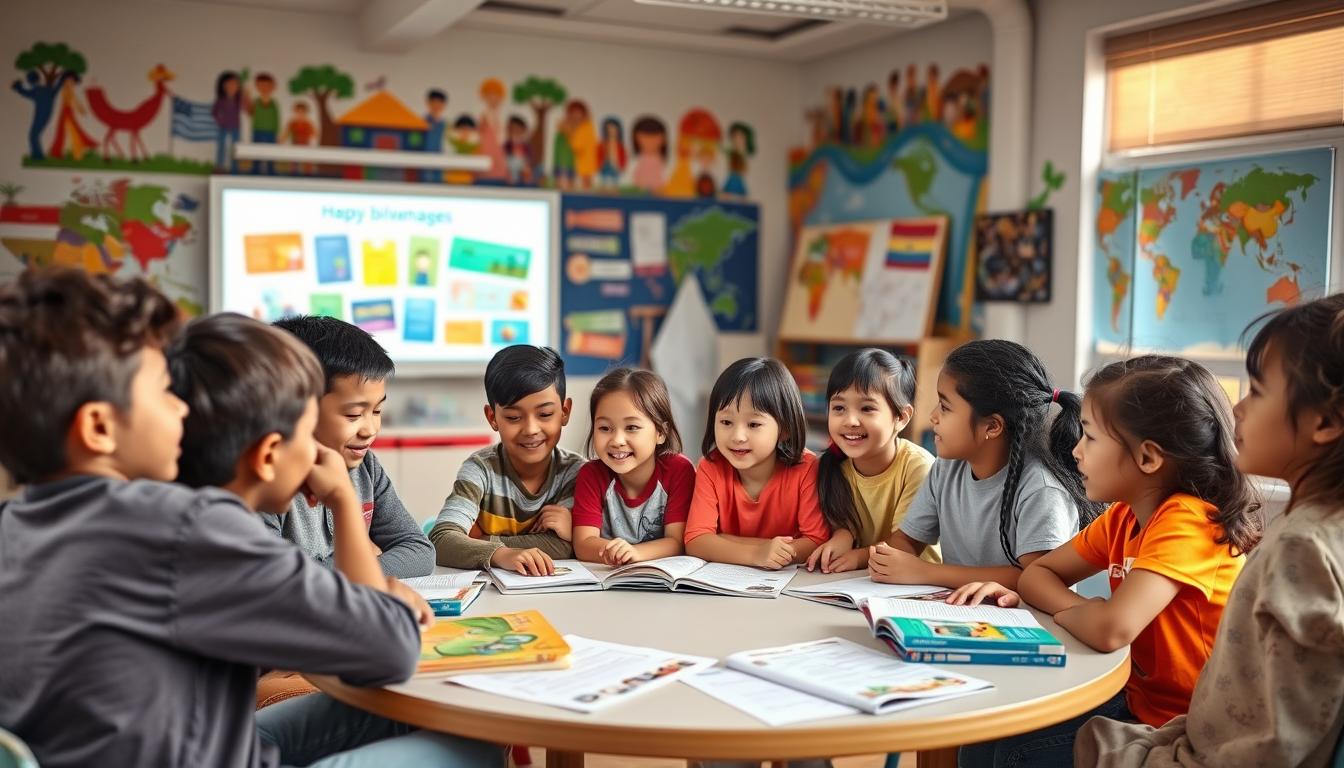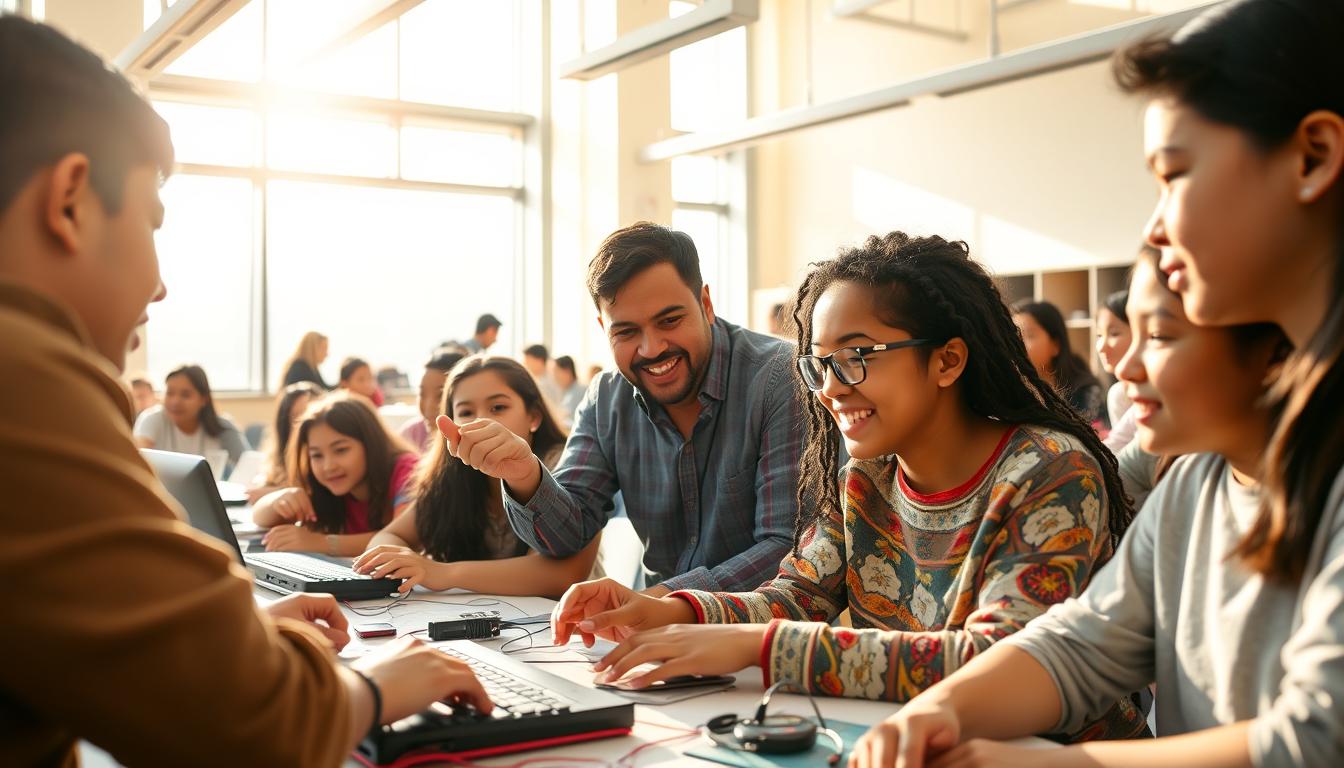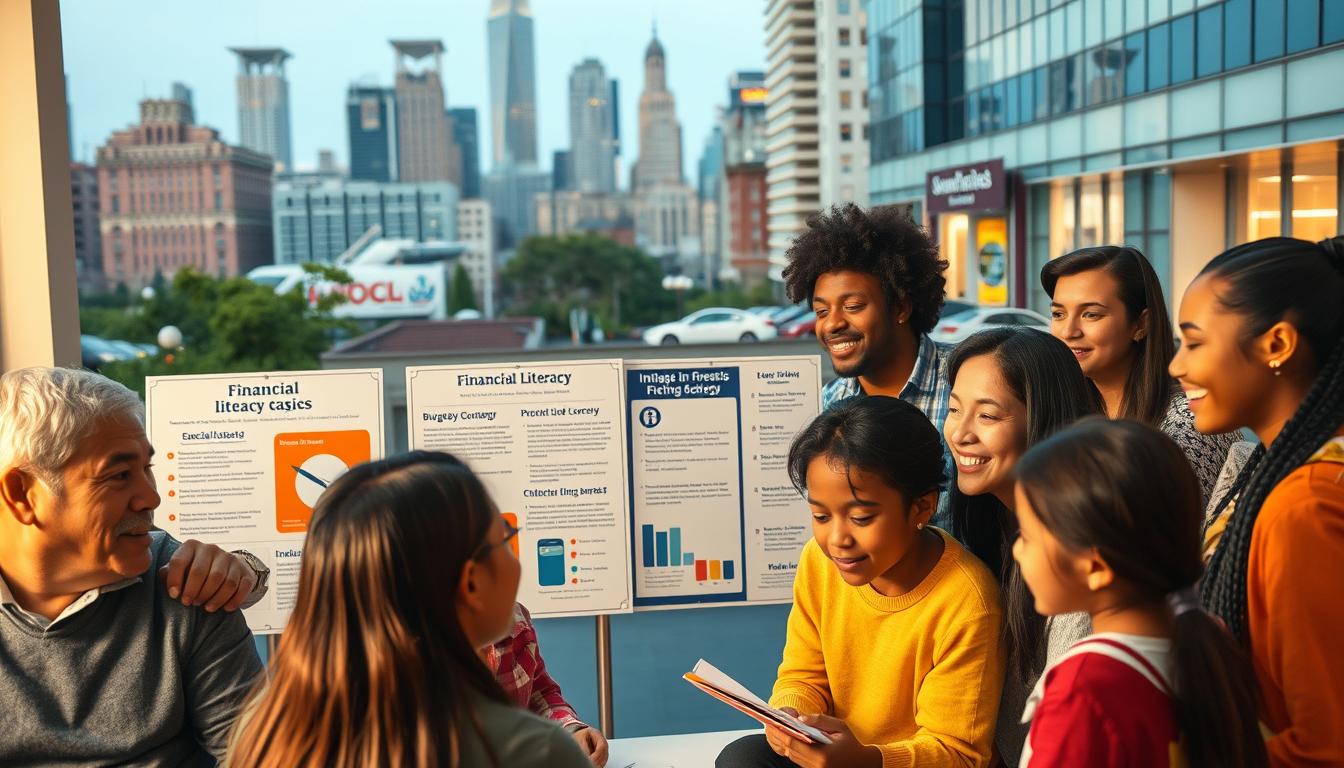Navigating Educational Opportunities: How Refugees Can Access Quality Learning Tools
Anúncios
Education is key for refugees to start anew and fit into their new homes. In the U.S., refugees face many obstacles, like language issues and interrupted schooling. It’s crucial to know these challenges to see why special education programs are needed.
These programs give refugees the tools they need to succeed. Groups like Refugee Council USA highlight education’s role in helping refugees grow. They offer ways for refugees to improve personally and professionally.
Understanding the Challenges Faced by Refugees
The path to education for refugees is filled with big hurdles. Many things make it hard for them to succeed in school. We need to understand these challenges to help them learn better.
Language Barriers
Language is key for refugees in school. Many struggle to talk and listen in class. This makes it hard for them to join in and learn.
Prior Educational Disruptions
Refugees often miss out on school because of war or moving. This makes it tough for them to keep up with others. They miss out on learning and growing.
Cultural Adjustments
Learning a new school system is hard for refugees. They have to get used to new ways of learning and social rules. This makes it harder for them to fit in and learn.
Importance of Education for Refugee Integration
Education is key for refugees to fit into their new homes. It helps them learn and grow, making them valuable to their communities. This way, they can make a positive impact and better their lives.
Economic Benefits
Educated refugees are great for local jobs. They fill gaps in the workforce, boosting productivity and creativity. By working, they help the economy grow and create jobs for others.
Social Cohesion
Education brings people together. It helps refugees and locals learn from each other. This builds strong bonds and a friendly community atmosphere.
Empowerment and Independence
Education gives refugees the tools to stand on their own. It empowers them to face new challenges with confidence. With knowledge and skills, they can shape their own futures.
Available Educational Programs for Refugees
Many educational programs are available for refugees. They help refugees learn and grow. These programs include community colleges, online learning, and help from non-profit groups. Each one is important for offering affordable education to refugee communities.
Community Colleges
Community colleges are a great choice for affordable higher education. They have programs made just for refugees. These colleges often help with money, so refugees can keep learning without worry.
Online Learning Platforms
Online learning is popular with refugees because it’s flexible. It lets people learn at their own speed. This is great for balancing school with work or family. Plus, many online courses are free, making learning easier.
Non-Profit Educational Organizations
Many non-profit groups help refugees with special programs. They offer education that fits different learning needs. For example, the International Institute of Education helps refugees with their studies. These efforts create a supportive space for refugees to learn and grow.
Role of Local Governments in Supporting Refugees
Local governments are key in improving education for refugees. They focus on refugee education and integration. This helps make communities more welcoming for everyone.
They fund important educational programs. This ensures refugees have the tools they need to learn.
Funding Educational Initiatives
Local governments set aside money for refugee education. This money helps create literacy programs and vocational training. It also supports community learning workshops.
This investment helps students grow academically. It also promotes social interaction and cultural exchange.
Providing Resources and Assistance
Local governments do more than just fund education. They also offer interpreters, educational materials, and community support. These resources make learning better and help refugees feel at home.
They also work with groups like the National Association of State Boards of Education. This shows how local support can make a big difference in refugee education.
Partnerships with Educational Institutions
Working together, schools and groups helping refugees are key to better learning. They open doors for refugees to get the education they need. This helps them access special resources tailored for their situation.
Collaborations with Universities
Universities are stepping up to help refugee students. They offer scholarships and special courses. These help students catch up after being out of school.
These programs are designed to help students grow personally and professionally. They give the skills needed for the future.
Mentorship Programs
Mentorship is vital for refugees in school. Mentors offer support and advice. They help refugees adjust to new schools and share tips on overcoming hurdles.
This support greatly improves their learning experience. It helps them reach their academic goals.
Language Acquisition Programs
Language programs are key for refugees to get an education. They help bridge communication gaps and aid in social integration. These programs are crucial for refugees to learn English, making it easier to adapt to new places.
ESL (English as a Second Language) Courses
ESL courses are a starting point for learning English. They are designed to meet the needs of refugees. Students work on reading, writing, listening, and speaking skills.
These courses help refugees join their communities fully. Many groups offer ESL classes. They give refugees the support they need to succeed in school and socially.
Immersion Programs
Immersion programs are a new way to learn English. They put refugees in real-life situations where they must speak English. This method helps them learn faster and feel more confident.
Studies show immersion programs work well. Refugees learn by talking to native speakers every day. They pick up language and cultural knowledge. Immersion helps refugees become more independent and integrated into society.
Navigating the U.S. Education System
Understanding the U.S. education system is key for refugees to integrate well. They need to know how to enroll in school. This knowledge greatly affects their learning journey. Knowing about public and private schools helps refugees choose what’s best for them.
Special education services are also crucial. They ensure all students get the help they need to do well.
Understanding School Enrollment Processes
Getting into U.S. schools involves several steps. These steps can change based on where you are. Refugees need to prepare by gathering documents like proof of where they live, vaccination records, and past school records.
This preparation makes the enrollment process easier. It also helps teachers understand each student’s background. This way, they can offer better support.
Differences Between Public and Private Schools
Public schools are free and funded by the government. Private schools, on the other hand, cost money and might have their own beliefs or teaching methods. Both have their good points and bad points.
Public schools usually offer more help for refugees, including programs for those who don’t speak English well. Private schools might have smaller classes and special programs. This can be good for students with specific needs.
Special Education Services
Special education services are vital for refugees with disabilities. These services are required by laws that make sure all students get a fair chance. This means refugees with disabilities can get the support they need to succeed in school.
This focus on inclusion and fairness is at the heart of the U.S. education system.
Developing Cultural Competence in Education
Cultural competence in education is key to a learning-friendly environment for refugees. Schools can enrich the curriculum with diverse cultural views. This approach builds understanding and respect among students.
Multicultural Curriculum Initiatives
Multicultural curriculum programs add depth to the classroom. They celebrate the value of different cultural backgrounds. This promotes a welcoming classroom environment.
Students learn more about the world, benefiting refugees greatly. This inclusive method lets refugees share their stories and experiences.
Teacher Training for Diversity
Teacher training on diversity is crucial for a diverse student body. Teachers learn to create lessons that include everyone. This training fosters a classroom that values all backgrounds and learning styles.
Trained teachers help refugees succeed in school. They make it easier for these students to learn and grow.
Scholarships and Financial Aid Opportunities
Many refugees face big challenges when trying to go to school. Scholarships and financial aid help a lot. They make it possible for refugees to get good education and succeed in their new homes.
There are many ways to help refugees, like grants and work-study programs. These help reduce financial worries and make learning better.
Grants for Refugee Students
Grants are a big help for refugee students. They help pay for school. Groups like the College Board list many grants to help refugees find them.
Work-Study Programs
Work-study programs are also very helpful. They let refugees work and earn money for school. This helps them pay for school and also helps them fit in with the community.
These programs are great for learning and growing. They help refugees develop skills and grow personally.
Technology as a Learning Tool for Refugees
In today’s world, technology is key for refugees’ education. Computers and the internet give them access to many learning resources. This helps them learn in new ways, making education more flexible and effective.
Access to Computers and Internet
Many programs help refugees get computers and internet. These efforts remove barriers to learning and boost their skills. With these tools, refugees can explore online courses, e-books, and more, improving their education.
Educational Apps and Online Resources
Educational apps are vital for refugees’ learning. They help with language, subjects, and thinking skills. Tech companies and groups work together to create tools that meet refugees’ needs. This makes learning easy and empowering for them.
Success Stories of Refugees in Education
Many refugees have changed their lives through education. They turned hard times into chances for success. Programs that help refugees get an education are key to their stories.
Case Studies of Achievers
A young woman fled war and joined a community college. With help from education programs, she did well and got a degree in social work. Her story shows how education builds strength.
Another refugee used online classes to finish high school. His hard work earned him a scholarship for a vocational program. This shows how new ways to help refugees can lead to success.
Impact on Local Communities
When refugees succeed, their communities feel it too. They bring skills and help the local economy grow. Their success also strengthens community bonds.
Thanks to local groups and schools, refugees’ success stories keep coming. These stories prove that giving refugees a chance at education works. They improve not just their own lives but also the communities that welcome them.
Future Trends in Refugee Education
The world of refugee education is changing fast. There’s a big push for new policies and ideas to help refugees learn. Countries are working on making schools welcoming for everyone, especially for those who have been displaced.
These changes mean refugee education is a big topic in policy talks. It’s all about making learning easier for everyone.
Policy Changes and Innovations
New policies are making education better for refugees. Governments and groups are focusing on what refugees need to learn. They’re working on ways to help with language, past school issues, and adjusting to new cultures.
They’re making it easier for refugees to join schools and offering different learning paths. This way, schools can meet the needs of refugee students better.
Expanding Global Learning Initiatives
There’s also a big effort to work together worldwide on refugee education. Groups and NGOs are sharing ideas and creating learning materials that can be used everywhere. This helps more people get a good education, no matter where they are.
This teamwork is making education better for refugees and the communities that welcome them. It’s shaping the future of education for refugees everywhere.
FAQ
What challenges do refugees face in accessing education?
Why is education important for refugee integration?
What types of educational programs are available for refugees?
How do local governments support refugee education?
How can educational institutions partner with organizations to support refugees?
What language acquisition programs are available for refugees?
How can refugees navigate the U.S. education system?
What is the significance of developing cultural competence in education?
What financial aid opportunities exist for refugee students?
How does technology enhance education for refugees?
Can you share success stories of refugees in education?
What are the future trends in refugee education?
Published on: 28 de February de 2025

Luke Martin
Luke Martin, author of Credwallets.com, is a mathematics graduate with a specialization in financial markets. Known for his love of pets and his passion for sharing knowledge, Luke created the site to provide valuable insights into the complexities of the financial world. His approachable style and dedication to helping others make informed financial decisions make his work accessible to all, whether they're new to finance or seasoned investors.







